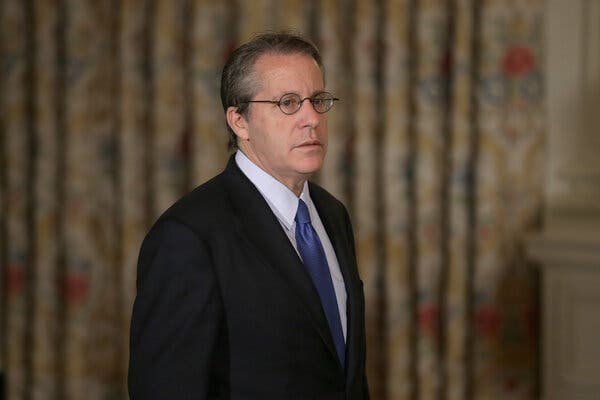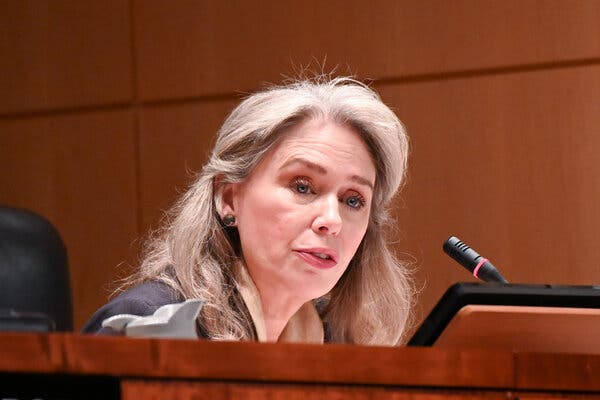The investment firms Blackstone and Starwood Capital announced on Monday that they planned to acquire the hotel operator Extended Stay America for $6 billion, the latest deal premised on a post-pandemic rebound in travel.
The deal is a bet that the mid-tier hotel chain that provides guests with amenities like kitchens and laundry facilities will prosper as the U.S. economy recovers. The chain had a 74 percent occupancy rate last year, above the industry average, with many rooms filled by essential workers.
The company’s new owners hope those rooms will soon add more tourists and traveling professionals. Extended Stay has about 600 locations across the United States.
“Our occupancy levels across the brand now rival the pre-Covid levels,” Bruce Haase, Extended Stay’s chief executive, told analysts on the company’s earnings call last month. “And unlike the rest of the industry that was still reaching for occupancy, we can now turn much of our attention to driving higher rates.”
The company’s shares have more than doubled over the past year, and the acquisition offer is a 15 percent premium to its closing stock price at the end of last week.
Starwood and Blackstone both have experience investing in hospitality, and Blackstone has even owned Extended Stay before — twice. It acquired the company for $3.1 billion in 2004, before selling it three years later for $8 billion. It was also part of a consortium that bought the business out of bankruptcy in 2010, outbidding a group led by Starwood Capital. Extended Stay then went public in 2013.
Other private equity firms have similarly bet on a recovery of the hospitality industry. Apollo Global Management announced plans this month to join with Vici Properties to acquire the Venetian hotel and casino in a $6.25 billion deal that also includes the Las Vegas property’s large expo center.

The payments company Stripe is worth $95 billion after a new round of funding, making it the most valuable start-up in the United States.
The San Francisco and Dublin-based company said on Sunday that it had raised $600 million in new funding from investors including Sequoia Capital, Fidelity Management and Ireland’s National Treasury Management Agency. The investment nearly triples Stripe’s last valuation of $35 billion.
The funding comes amid a surge in the adoption of digital tools and services in the pandemic as more people live, work and make purchases online. That has fueled a wave of investment into, and eye-popping valuations at, tech start-ups, as well as a frenzy of highly valued initial public offerings. Investors have valued Airbnb, the home rental start-up that recently went public, at $123 billion. Roblox, a kids gaming start-up, saw its valuation soar to $45 billion when it went public last week.
Founded in 2010, Stripe builds software that enables businesses to process payments online. As more people have turned to online shopping in the pandemic, Stripe’s offerings have been in demand. It is the largest among a class of fast-growing, highly valued financial technology companies.
Stripe is now processing hundreds of billions of dollars in payments each year across 42 countries, Dhivya Suryadevara, Stripe’s chief financial officer, said in an interview. “We are in a hyper-growth industry and within that, the company itself is experiencing hyper-growth,” she said. Ms. Suryadevara declined to share specifics on Stripe’s revenue or growth.
Stripe has been considered a candidate to go public. Coinbase, another financial technology start-up, filed to go public later this month in a transaction that some expect could hit $100 billion. Robinhood, a stock trading app, has also seen its valuation surge in the pandemic.
Stripe said in an announcement that it planned to use the money to expand in Europe, including its office in Dublin. The company’s sibling founders, John Collison, 30, and Patrick, 32, were born in Ireland.
In a statement, John Collison, Stripe’s president, said the company would focus heavily on Europe this year. “The growth opportunity for the European digital economy is immense,” he said.
The company, which got its start working with start-ups and small businesses, will also invest in building more tools to help larger businesses handle payments. It counts 50 businesses that process more than $1 billion a year as customers.

President Biden has tapped Gene Sperling, a longtime top economic aide to Democratic presidents, to oversee spending from the $1.9 trillion relief package that the president signed into law last week and planned to promote across the country this week.
Mr. Sperling was director of the National Economic Council under President Bill Clinton and President Barack Obama. In Mr. Obama’s administration, where he first served as a counselor in the Treasury Department, Mr. Sperling helped to coordinate a bailout of Detroit automakers and other parts of the administration’s response to the 2008 financial crisis.
He advised Mr. Biden’s campaign informally in 2020, helping to hone the campaign’s “Build Back Better” policy agenda. He will serve as the White House American Rescue Plan coordinator and as a senior adviser to Mr. Biden.
His appointment could be announced as soon as today. Mr. Biden is scheduled to give remarks on the implementation of his relief bill, known as the American Rescue Plan, on Monday afternoon. The White House press secretary, Jen Psaki, told reporters last week that Mr. Biden intended to appoint someone to “run point” on implementing the plan — a role that Mr. Biden held for the Obama administration’s $800 billion stimulus plan in 2009.
Mr. Sperling did not respond to a message seeking comment. Friends have described him in recent months as eager to join the administration, and he had been mentioned as a possible appointee to head the Office of Management and Budget after Mr. Biden’s first nominee for that position, Neera Tanden, withdrew amid Senate opposition. His appointment was reported earlier by Politico.
Mr. Sperling’s challenge with the rescue plan will be different than the one Mr. Biden faced in 2009, because the relief bill that Mr. Biden just signed differs starkly from Mr. Obama’s signature stimulus plan. The Biden plan is more than twice as large as Mr. Obama’s, and it centers on a wide range of payments to low- and middle-income Americans, including $1,400-per-person direct checks that Treasury officials started sending electronically to Americans over the weekend. It includes money meant to hasten the end of the Covid-19 pandemic, including billions for vaccine deployment and coronavirus testing.
But the plans also have similarities, including more than $400 billion each in total spending for school districts and state and local governments.
An administration official said Mr. Sperling would work with White House officials and leaders of federal agencies to hasten the delivery of the money, including partnering with state and local governments on their shares of relief spending from the bill.
The pharmaceutical industry is popular right now, which is perhaps unsurprising considering that the end of the pandemic depends on Covid-19 vaccines. Drug makers’ rapid response to the crisis has transformed public sentiment about the industry, moving it from one of the most reviled to one of the most respected, according to new data from the Harris Poll, reported first in the DealBook newsletter.
A year of living in existential and economic fear created unlikely heroes. For the past year or so, the Harris Poll has monitored public sentiment in weekly surveys of more than 114,000 people. At the height of the emergency, more than half of respondents were afraid of dying from the virus and a similar share were afraid of losing their jobs. “Only in the past month, with vaccines rising and hospitalizations and deaths declining, is fear abating,” the report noted.
Business generally got good grades during the pandemic. Many respondents cited companies as important to solving problems, where previously they were considered the cause of social woes. Two-thirds said that companies could do a better job coordinating the vaccine rollout than the government could.
Approval ratings rose for many industries from January last year to February this year. But the reputation of the pharma industry — stained by its role in the opioid crisis and criticized for high drug prices — benefited the most. In January 2020, only 32 percent of respondents viewed the industry positively; late last month, that had almost doubled, to 62 percent.
“The pharmaceutical industry’s ability to innovate and perform under intense pressure and in a time of crisis is the ultimate validation for any business,” said John Gerzema, the chief executive of the Harris Poll.

A deal that would reshape the American newspaper industry has run into complications just one month after an agreement was reached, according to three people with knowledge of the matter.
As a result, the New York hedge fund Alden Global Capital may have to fend off a new suitor for Tribune Publishing, the chain that owns major metropolitan dailies across the country, including The Chicago Tribune, The Daily News and The Baltimore Sun, the people said.
On Feb. 16, Alden, the largest shareholder in Tribune Publishing, with a 32 percent stake, reached an agreement to buy the rest of the chain in a deal that valued the company at $630 million, reports The New York Times’s Marc Tracy. In the deal, Alden would take ownership of all the Tribune Publishing papers — and then spin off The Sun and two smaller Maryland papers, selling them for $65 million to a nonprofit organization controlled by the Maryland hotel magnate Stewart W. Bainum Jr.
In recent days, Mr. Bainum and Alden have found themselves at loggerheads over details of the operating agreements that would be in effect as the Maryland papers transitioned from one owner to another, the people said. In response, Mr. Bainum has taken a preliminary step toward making a bid for all of Tribune Publishing, the people said.
Mr. Bainum has asked a special committee of the Tribune Publishing board made up of three independent directors for permission to be released from a nondisclosure agreement prohibiting him from discussing the deal, so that he would be able to pursue partners for a new bid, the people said.
A spokeswoman for Mr. Bainum said he had no comment. Through a spokesman, Tribune Publishing’s special committee declined to comment. An Alden spokesman had no comment.

More than 400 workers at a Tesla plant in California tested positive for the coronavirus between May and December, according to public health data released by a transparency website.
The data provides the first glimpse into virus cases at Tesla, whose chief executive, Elon Musk, had played down the severity of the pandemic and reopened the plant, in Fremont, Calif., in May in defiance of guidelines issued by local public health officials.
Automakers across the country halted production and closed plants for two months last year from mid-March until mid-May. After resuming production, other automakers publicly announced when workers had tested positive for the virus and halted production to prevent further infection among employees and to disinfect work areas.
Tesla, however, has released little information about employee coronavirus cases.
The data was obtained by the website PlainSite, which works to make legal and governmental documents publicly accessible. It showed that 440 cases were reported at the Tesla plant, which employs some 10,000 people. The number of cases rose to 125 in December from fewer than 11 in May.
A year ago, after officials in California ordered manufacturing plants to close, Mr. Musk suggested on Twitter that the measure was unnecessary and that cases in the United States would be “close to zero.”
He also called virus restrictions “fascist,” threatened to move Tesla out of California, and then reopened the plant a week before health officials said it was safe to do so. More recently, Mr. Musk has questioned on Twitter the effectiveness of Covid vaccines.

Allison Herren Lee was named acting chair of the Securities and Exchange Commission in January, and she has been active since, especially when it comes to environmental, social and governance issues.
The agency has issued a flurry of notices that such disclosures will be priorities this year. On Monday, Ms. Lee, who was appointed as a commissioner by President Donald J. Trump in 2019, is speaking at the Center for American Progress, where she will call for input on additional E.S.G. transparency, according to prepared remarks reviewed by the DealBook newsletter.
The supposed distinction between what’s good and what’s profitable is diminishing, Ms. Lee will argue in the speech, saying that “acting in pursuit of the public interest and acting to maximize the bottom line” are complementary.
The S.E.C.’s job is to meet investor demand for data on a range of corporate activities. “That demand is not being met by the current voluntary framework,” she will say. “Human capital, human rights, climate change — these issues are fundamental to our markets, and investors want to and can help drive sustainable solutions on these issues.”
Ms. Lee will also argue that “political spending disclosure is inextricably linked to E.S.G. issues,” based on research showing that many companies have made climate pledges while donating to candidates with contradictory voting records. The same goes for racial justice initiatives, she will say.
Although Ms. Lee is only the acting chief, she’s laying the groundwork for more action, based on recent statements by Gary Gensler, President Biden’s choice to lead the S.E.C. In his confirmation hearing this month, Mr. Gensler said that investors increasingly wanted companies to disclose risks associated with climate change, diversity, political spending and other E.S.G. issues.
Not everyone at the S.E.C. is on board. Hester Peirce and Elad Roisman, fellow commissioners also appointed by Mr. Trump, recently protested the “steady flow” of climate and E.S.G. notices. They issued a public statement, asking, “Do these announcements represent a change from current commission practices or a continuation of the status quo with a new public relations twist?”
Stocks on Wall Street were little changed on Monday after closing at a new high on Friday. Most European stock indexes were higher.
The yield on 10-year Treasury notes, a key driver of stock market movement lately, fell to 1.61 percent on Monday. It had climbed as high as 1.64 percent on Friday, a level not seen since February 2020, as investors considered whether a nearly $1.9 trillion stimulus package would be inflationary alongside an expected economic recovery as more Americans are vaccinated.
But on Sunday, Janet L. Yellen, the Treasury secretary, pushed back against these concerns. “Is there a risk of inflation? I think there’s a small risk and I think it’s manageable,” she said on ABC. She added that she expected prices to rise over the spring and summer but only temporarily because of how much they fell last year.
“We have had very well-anchored inflation expectations and a Federal Reserve that’s learned about how to manage inflation,” Ms. Yellen said.
U.S.
-
The S&P 500 dipped in early trading, while the Nasdaq composite was up slightly. The Dow Jones industrial average was flat.
-
West Texas Intermediate crude, the American benchmark, fell about 1.4 percent to below $65 a barrel.
Europe
-
The Stoxx Europe 600 rose 0.2 percent, led higher by gains in health care and consumer stocks. The FTSE 100 in Britain fell 0.2 percent.
-
Shares in Flutter Entertainment, a British betting and entertainment company, rose nearly 7 percent after it confirmed that it was considering publicly listing shares of FanDuel, its U.S. sports betting website.
-
The board of Danone, the French food company, said Monday it had removed its chairman and chief executive, Emmanuel Faber. Its share price rose about 3 percent. The shake-up comes after a monthslong campaign by activist investors, The Financial Times reported. Under Mr. Faber, Danone changed its legal status to be a purpose-driven company with a social mission of “health through food.” Danone’s water and dairy brands include Evian, Alpro and Silk.
Asia
-
Shares in Tencent were at their lowest in two months, dropping 3.5 percent on Monday after a loss of 4.4 percent on Friday. The Chinese tech company is facing a crackdown from antitrust regulators, Bloomberg reported.






